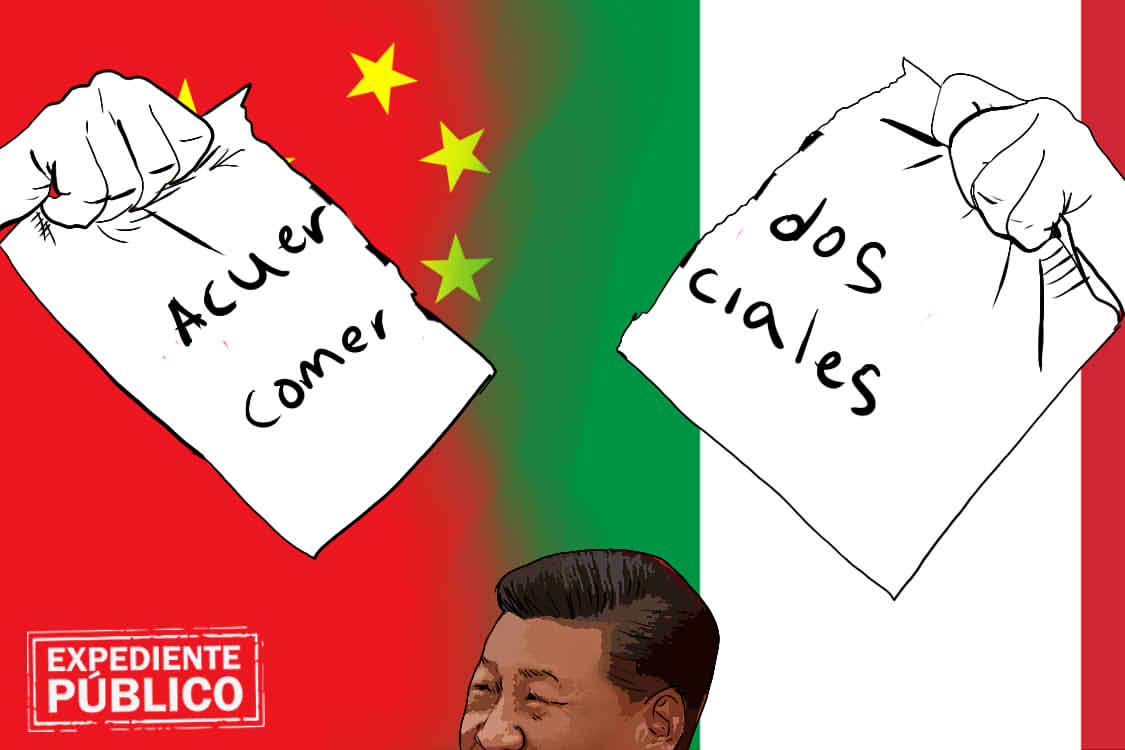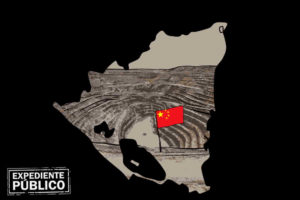* Italy did not renew its trade deals with China within the Belt and Road Initiative, a blow to Xi Jinping’s interests in the West.
** Italian Prime Minister Giorgia Meloni announced that she was abandoning the project because the results obtained do not meet Rome’s expectations.
*** The decision offers a lesson to subscribing Latin American countries to assess the risks of long-term borrowing from Beijing without reaping benefits in return, experts say.
Eric Lemus and Yarely Madrid / Expediente Público
Giorgia Meloni’s government shook the calculations of its Chinese counterpart, Xi Jinping, after declining to continue in the global Asian project that failed to meet promised expectations, only brought more debt.
The Belt and Road Initiative (BRI) is a strategic initiative by China to connect with the rest of Asia, Europe, and Africa, on what many refer to as the new “silk road,” in reference to the road used in ancient times and divulged by the 11th-century voyages of the Venetian merchant Marco Polo.
In 2017, China’s president presented the initiative in Latin America as the “natural extension of the Maritime Belt” with promises of rail and port projects.
Suscríbase al boletín de Expediente Público y reciba más información
Data from the Green Finance & Development Center (GFDC) at Fudan University in Shanghai, China, show the accession of countries such as El Salvador, Nicaragua, Costa Rica, Panama, Cuba, Venezuela, Guyana, Suriname, Ecuador, Peru, Chile, Bolivia, and Argentina.
See also: Tourist wharf in El Salvador, 24 million secrets in Chinese investment
Just look for suppliers
Alejandra Cuéllar, Mexico and Central America editor of the journalistic platform Diálogo Chino, explained to Expediente Público that Beijing’s intention with the hemisphere has to do with the interest in obtaining raw materials and food.
“The development of the population, the increase in wages and consumption in general in China has given rise to a great demand for raw materials,” Cuéllar explained.
China’s investment in infrastructure is aimed at exporting Latin American raw materials more efficiently, according to the editor.
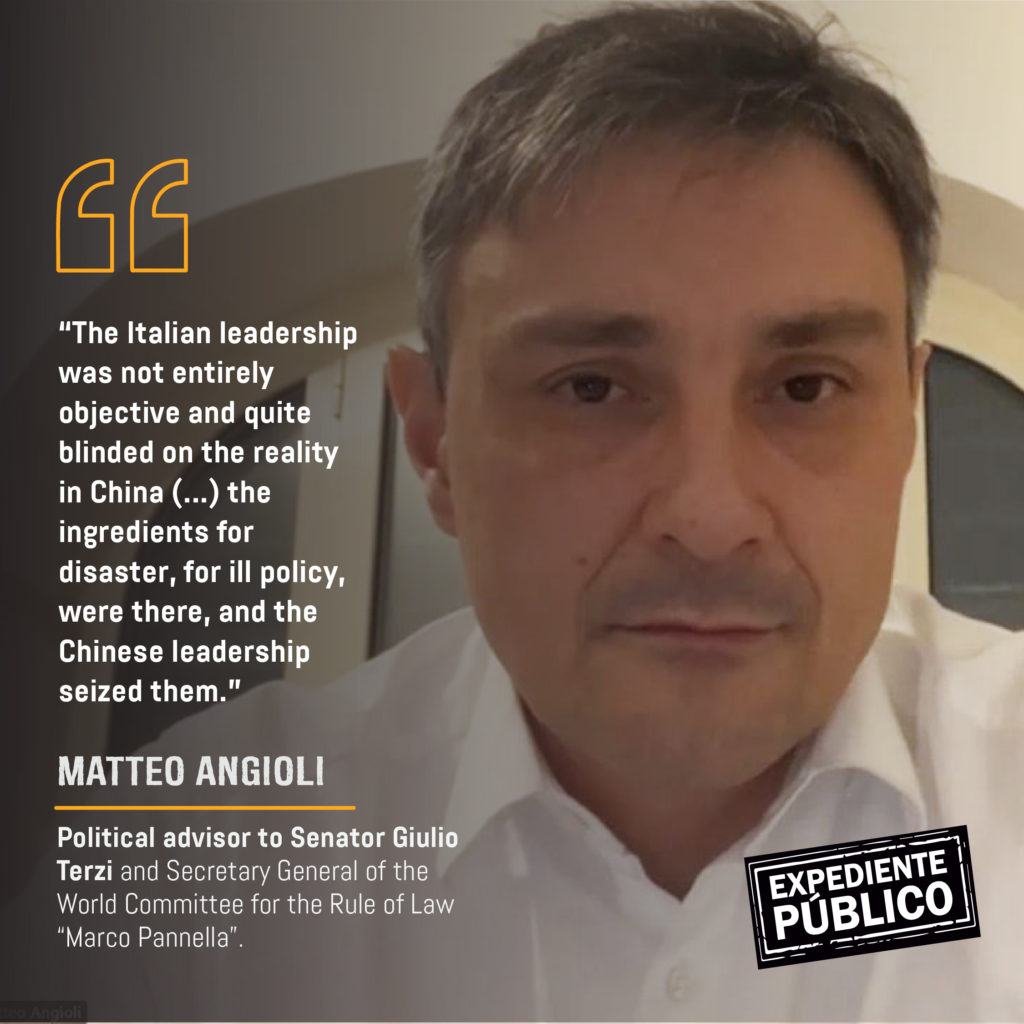
Italy gives up on promises
Matteo Angioli, political advisor to Senator Giulio Terzi and secretary general of the Global Committee for the Rule of Law of the Italian Senate, in conversation with Expediente Publico, said that Meloni’s government based its decision on the poor results it has obtained so far.
“The idea was to seize the momentum that China was having, and the Chinese growth that was undeniably there, to develop the economic well-being, the economic profile of Italy,” explains Angioli.
“That’s why then-Prime Minister Giuseppe Conte agreed to make bigger steps than other countries – which had bilateral agreements – by deciding to step up the relationship with a Memorandum of Understanding to join the BRI.”
“The expectations were much higher than the actual possibilities and the actual reality … The trade balance is very clear. Italian exports to China increased by a few billion, while China increased at least twofold,” he said.
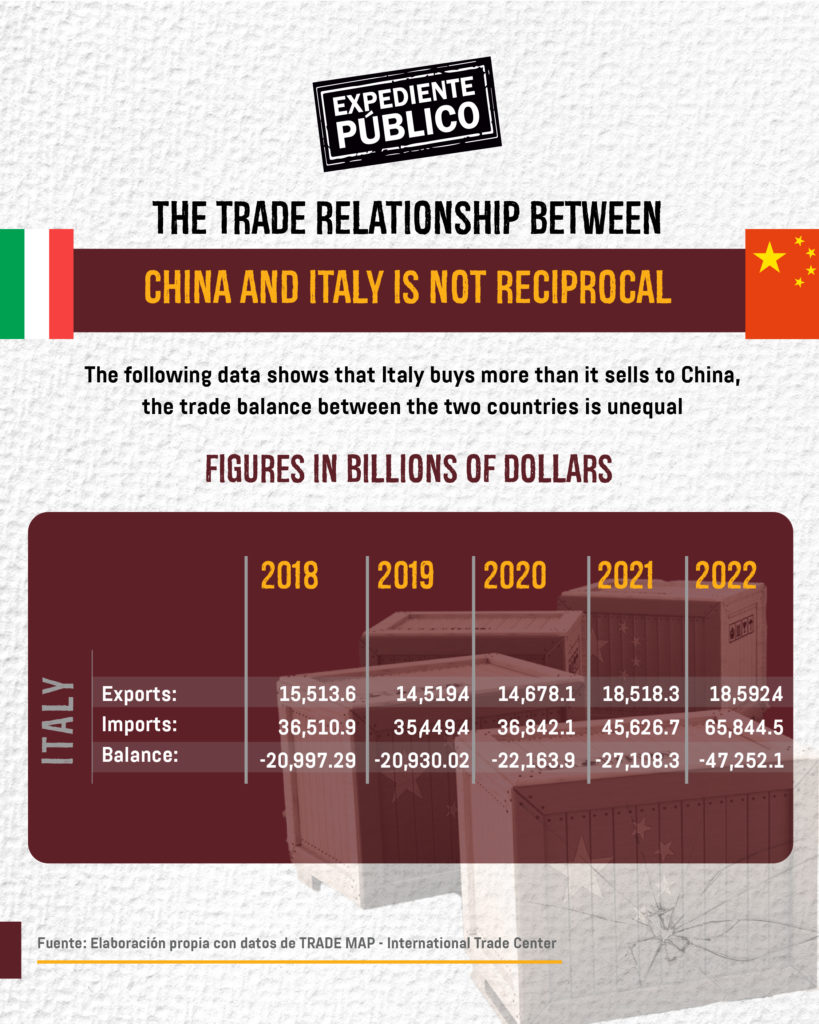
China doesn’t care how you enter
For the politician, “Italy set an example by withdrawing from the Memorandum of Understanding. We know that China is dealing bilaterally with each of the 27 member countries of the EU.”
“In Latin America in particular, there is not much sector-by-sector difference in terms of whether they are ‘Belt and Road’ investments or economic projects. In fact, they tend to be quite similar,” says Matt Schrader, a researcher on Capitol Hill and at the International Republican Institute.
Schrader, who participated in the August meeting “Analyzing China’s Influence in Central America” organized by Expediente Abierto, notes that if a country is not a member of “The Belt and Road,” it does not impede them from deciding to invest in infrastructure projects.
“It doesn’t really matter if it has that label,” he told Expediente Público.

In fact, one of the examples of how China partners with a country beyond “The Belt and Road” is El Salvador, where it granted a non-reimbursable cooperation agreement to the tune of US$500 million that was granted following Nayib Bukele’s visit to Beijing in December 2019.
The most attractive thing is the opacity
Douglas Farah, a security consultant and geopolitical expert at IBI Consultant, told Expediente Público that Latin American countries generally promote Chinese rapprochement because they do not require “any counterpart in terms of corruption or how the money is actually handled.”
See also: Shrimp exporters lose millions after Honduras’ break with Taiwan
“China has opened the doors for governments such as those of Nayib Bukele in El Salvador or Xiomara Castro in Honduras to embrace this project because it does not entail any fiscal responsibility of transparency,” Farah recalls.
“So the real cost that one is seeing now in countries like Ecuador, Brazil, or Argentina where once they are already embedded in this, they cannot get out because of the measures they have accumulated. You see how the electric dams that the Chinese built in Ecuador are breaking while the country is in debt for projects that do not work,” he exemplifies.
Meloni distances herself
The government in Rome was the only country in the G-7, which groups the world’s industrialized economies, to enter into the program in 2019 with the aim of opening new trade routes, as in the past.
However, in the campaign prior to her mandate, Meloni said that the deal was not beneficial to Italian interests.
“In the specific case of Italy, there is a desire to disassociate itself from the Chinese project, which, by comparison, is more imperialist than anything the US has done in the last 50 years, and, at the same time, to get rid of the enormous burden of being indebted to the Chinese and the cost in terms of democratic life, corruption, and so on,” Farah told Expediente Público.
Italian sociologist Tiziano Breda, a researcher at the Institute of International Affairs (Istituto Affari Internazionali, IAI), highlights two main reasons for Italy’s refusal to renew the agreement with the Asian giant.
Italy’s reasons
“Despite the promises of trade cooperation, of economic benefit in general, Italy has not seen any differences, in these particular years, with respect to the relations already established with China and which date back several decades and are already strong in terms of imports and exports,” Breda stresses.
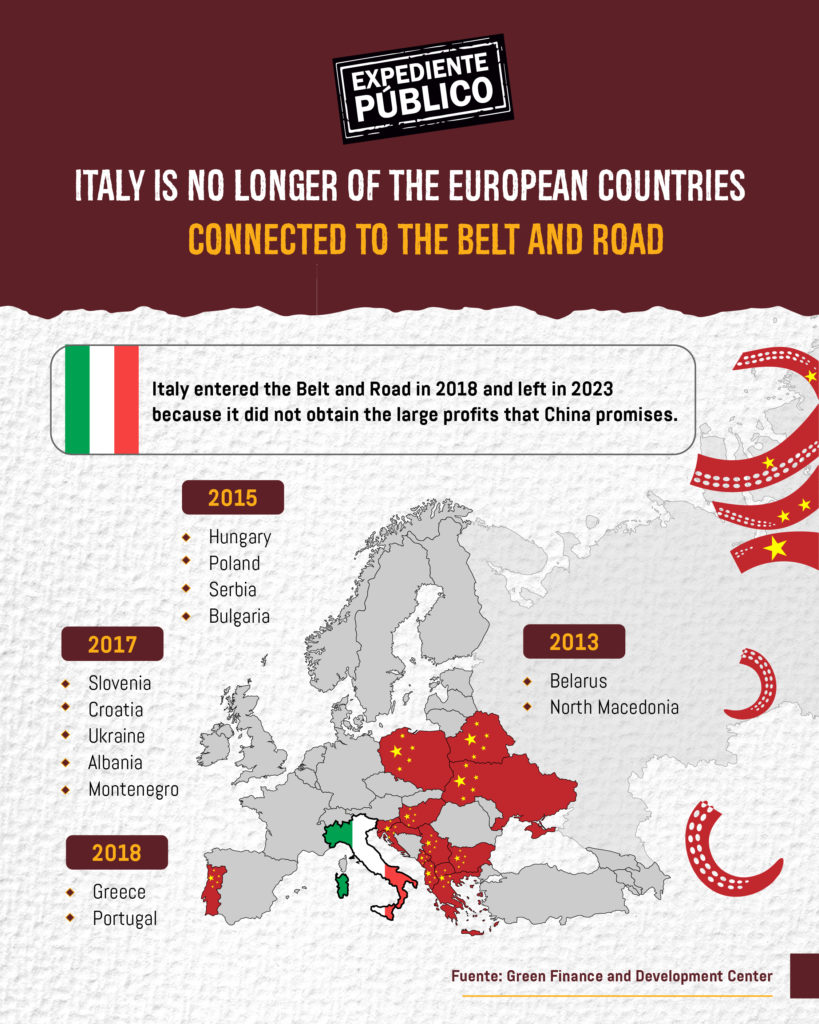
In Context: The China Index Reveals the Asian giant’s Methods of Infiltration into Society
“The other and more important assessment is the political one, based on the fact that this initiative – as much as it is painted as economic and commercial – is clearly one of the spearheads of Chinese foreign policy in its global projection and in its ambition to establish itself as a global power,” he said in a conversation with Expediente Público.
“Renewing that cooperation with China could have been frowned upon and interpreted as an element of unnecessary tension with Washington at this time when Europe needs the US very much” in the wake of Russia’s invasion of Ukraine, the Italian researcher argues.
The Cost of Environmental Impact
A report presented in February 2023 by the United Nations (UN) Committee on Economic, Social and Cultural Rights (CESCR) reveals that mining, oil, hydroelectric, dam, and railway projects by 11 Chinese companies in Argentina, Bolivia, Brazil, Chile, Colombia, Ecuador, Mexico, Venezuela, and Peru were carried out in fragile ecosystems.
The document shows that the Chinese companies have not made the necessary efforts to avoid significant environmental impacts in Latin America.
The reality is that the serious environmental impact of megaprojects within the Belt and Road Initiative is one of the most criticized factors towards Xi Jinping’s government, to which he responded with the discourse of a “more eco-friendly China” or greener China.
Alejandra Cuéllar says that although China invests resources in the development of renewable energy technologies, mining continues to take place in a traditional way and at the level of infrastructure projects “there is a long way to go.”
The biggest risk: over-indebtedness
Stanford University researchers Michael Bennon and Francis Fukuyama explain in their article “China’s Road to Ruin” how “The Belt and Road” endangers developing countries that are practically trapped in an over-indebtedness.
The debt is so large that countries are “unable to guarantee the financing of future projects and even to pay the debt service already accumulated.”
The risk of doing deals with Chinese companies is very big for Central American countries because they are not strong economies, have little capacity to pay, and, for the most part, have high levels of corruption, which in turn makes them fragile, says the editor of Diálogo Chino.
“Sometimes countries get dazzled by the large amounts of money that China offers when in the end you don’t see that you’re really going to have to pay that money and in what term,” Cuéllar says.
In fact, Breda of the IAI reminds this magazine that China’s reasons for Central America lie in the interest in displacing Taiwan from the isthmus, strengthening its diplomatic presence, and, above all, “to consolidate an infrastructural system of trade routes in which China has more influence than the United States.”
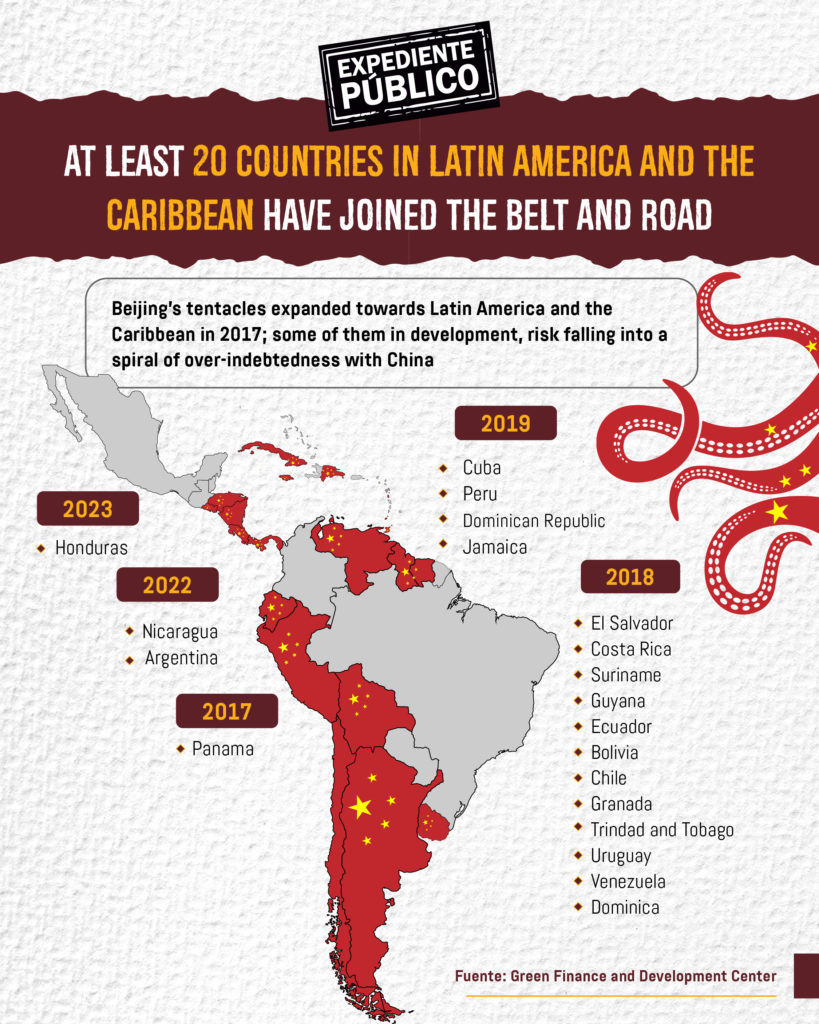
A country looking for opportunities
Journalist Eduardo Ulibarri, who worked in the Costa Rican foreign service, recalls that China “looks to any region of the world where it considers that it has economic and geopolitical opportunities.”
Ulibarri, who directed the newspaper La Nación in the nineties, reminds Expediente Público that even when Costa Rica “broke off the engagement,” Central America was a pro-Taiwan region.
China’s recognition is not for ideological reasons, but rather “it is an absolutely transactional attitude, of who gives me more,” said the former diplomat.
Regarding Italy’s decision to leave the Belt and Road, Ulibarri believes it is because the European Union is more concerned about China’s progress towards becoming a hegemonic power.
There is also the fact of Italy’s rapprochement with the United States, a “solid alliance” that Giorgia Meloni herself affirmed at the beginning of 2023.

